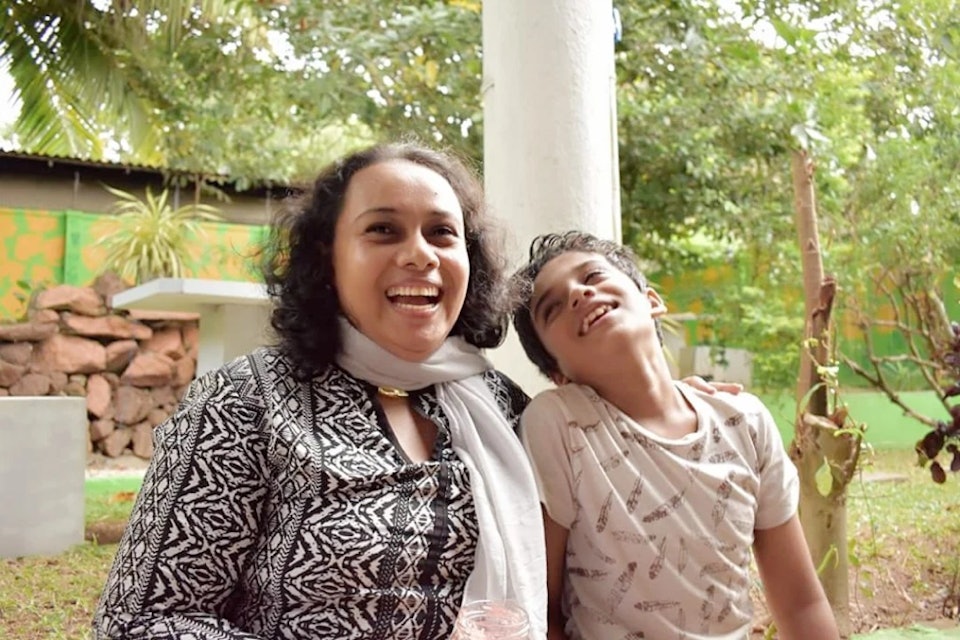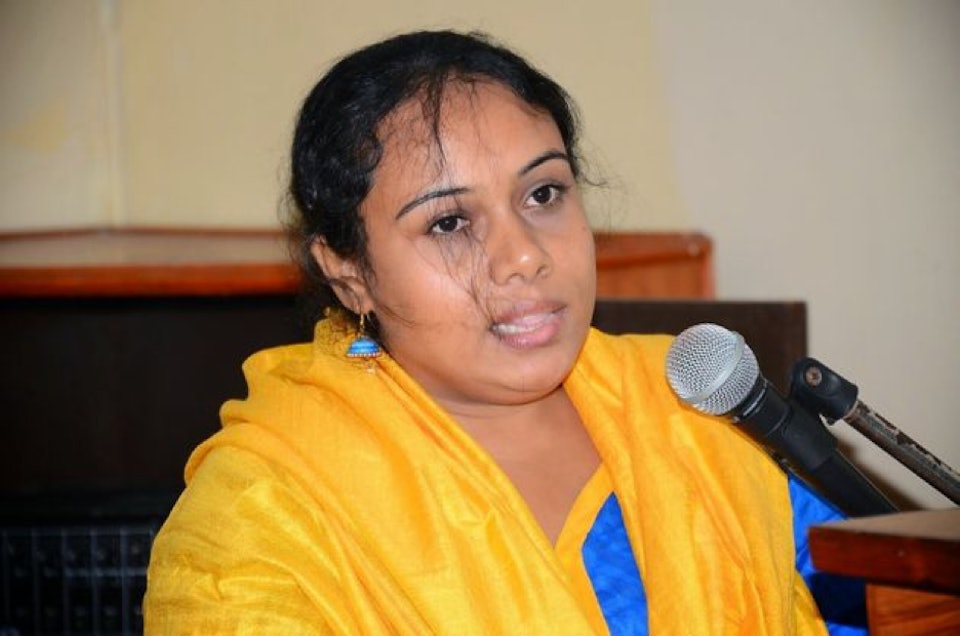Artist Profile
Sharmila Seyyid
Sri Lanka
Status: In Exile

Sri Lankan journalist, poet, writer, activist, and mother Sharmila Seyyid was barely 30 when she was forced into exile from eastern Sri Lanka. Seyyid has dedicated her life to addressing the socio-economic vulnerability of women in Sri Lankan society through both writing and activism, as a social worker, journalist, and author. As a writer, Seyyid interrogates themes related to women’s rights, children’s rights, humanitarian conflicts, youth activism, gender and sexuality, and more. Her novels center on the multiple burdens that Tamil-speaking Muslim women in Sri Lanka face, especially in the wake of the Sri Lanka’s decades-long civil war.
However, Seyyid’s dedication to advancing gender equality has not been without challenges, and Seyyid herself has become a target of the very persecution she seeks to fight. On November 18, 2012, following the release of her collection of poems Siragu Mullatha Penn, which translates to The Women Who Grew Wings, Seyyid was interviewed on BBC Tamil, where she observed that legalizing sex work would help keep sex workers safe. However, in Eravur, the conservative village where Seyyid lived, such statements sparked furor among the fundamental religious community. Seyyid rapidly became a target of vitriolic criticism, harassment, and death threats. Although she later clarified the statement, the clergy asked for an apology, and Seyyid fearlessly refused. Since then, Seyyid and her family have faced incessant attacks, including threats of acid-attacks and rape. Not longer after her interview, the English academy she ran alongside her sister was vandalized, and her students and their families were subjected to further harassment.

In December 2012, as a result of this massive backlash, Seyyid made the difficult decision to go into self-exile, traveling to India with her son, who was two years old at the time. Although this period posed immense challenges for Seyyid, she managed to use the time to grow as an artist. While in exile, she completed her higher education and published her first novel, Ummath, in 2014. Ummath spans the three decades of the Sri Lankan civil war, a bloody conflict which raged from 1983 to 2009 between the Sri Lankan Army and the Liberation Tigers of Tamil Eelam, also known as the Tamil Tigers, an armed insurgent group that sought to form an independent state for the nation’s Tamil minority. During and after the civil war, Tamils were persecuted, tortured, killed, and denied citizenship by Sri Lankan authorities, to such an extent that in 2000 there were still around 300,000 stateless Tamil people living in Sri Lanka.

Capturing the lives of three young women, Ummath dissects the complex realities of extremism, nationalism, chauvinism, fundamentalism, and sexism that governed Sri Lankan society during and in the aftermath of the civil war. The novel has since been translated into English and published by HarperCollins in Delhi, India.
The civil war and its legacy have had a profound impact on human rights in the country, including on freedom of expression. Although freedom of expression is guaranteed in the constitution, for decades crimes against journalists have been perpetrated with general impunity. Members of the Tamil minority find the climate particularly hostile toward free speech. Academics have reported facing discrimination for studying Tamil issues, and in November 2019, Mahinda Rajapaksa, who was credibly accused of massacring Tamil civilians during the civil war, became prime minister of Sri Lanka. It is in the midst of this threatening environment that Seyyid found herself embroiled.
Several sections from Ummath that question the practice of purdah––the seclusion of women from public observation by covering their faces and bodies––circulated widely online. The controversial passages sparked rage among many Sri Lankans, and in March 2015, fundamentalist groups ordered Seyyid to remove all her photographs from Facebook within 24 hours. When she refused to do so, the group posted a graphic doctored image that allegedly showed her body after being raped and murdered. The image went viral and was so disturbingly realistic that her family and friends believed she had truly died.

Nonetheless, after living at the most threatening edges of society for four years in India, Seyyid returned to Sri Lanka in 2015 to continue her work as a human rights advocate and writer. Upon her return, she established Mantra Life, an organization that seeks to lessen the gender gap in Sri Lanka’s economic, political, and social spheres by helping women become financially independent. In 2014, Seyyid was awarded the "Inspirational Women" Award by Women in Management in Sri Lanka, and was recognized for her ongoing literary achievements when Siragu Mulaitha Pen won the Tamiliyal Award from the Writers Motivation Center in 2013 and Ummath won the Best Novel of the Year Award by the Tamil Progressive Writers and Artists Association in 2014. After Ummath, Seyyid went on to publish the novels Ovva (“Incompatible”), in 2015, and Panikkar Pethi (“Granddaughter of Panikkar”), in 2019.

Unfortunately, Seyyid has continued to feel unsafe in her country. On Easter Sunday in 2019, a group of churches in Sri Lanka were bombed by National Thowheeth Jama'ath (NDJ), a militant Islamist group. Resulting in the death of hundreds, the Easter Sunday bombings have been the most violent incident in Sri Lanka since the civil war, inciting suspicion, insecurity, and fear across the country. In their wake, authorities contacted Seyyid to notify her that she had been named one of the NDJ’s targets, likely due to her outspoken statements on gender equality. Feeling that her family was at great risk, Seyyid was again forced to go into exile and separate from her son in August 2019. For two months, she was a resident at the renowned Art Omi residency in New York, and traveled from there to India and then Thailand, where she currently resides in continued self-exile. Nevertheless, ARC applauds Seyyid’s courage and her unflagging devotion to fighting for human rights through literature and activism.
By Mabel Acosta, May 2020. Mabel is a recent graduate of the John Jay College of Criminal Justice.